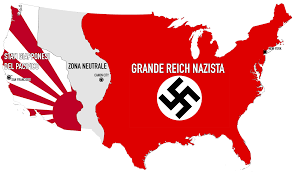It seems America’s Founders needed an 11th Amendment added to the original 10 Bill of Rights: The right to not be offended. Which of course would have replaced the first amendment, and thus freedom of speech would never have existed in America. While we’re at it, we may as well just get rid of freedom of religion too. All that freedom just cramps the modern liberal/progressive lifestyle. We’ve heard much of late that on many college campuses in America there is now such a thing as “microagressions,” which as best as I can tell means a very small slight, intended or not, is de facto an act of violence. But alas, these limits on speech are not limited to college campuses.
John Fund tells how ads for a new Amazon TV show in a New York subway line drew the ire of progressive sensitivities, and were ordered to be taken down by the Mayor of the city and governor of the state. The ads were for the show Man in the High Castle, which was instantly added to my Amazon Prime watch list. The premise sounds interesting. Instead of the Allies winning WWII, the Axis powers did, and Japan and Germany split up the United States. Life appears somewhat normal on the surface, but it is anything but. As we can imagine, everything changed:
The fascist dystopia depicted in the series is disturbing, but the show’s writers give viewers reason to hope. A mysterious “man in the high castle” is producing films that depict an alternative history in which the Allies win World War II and America is free and prosperous. The plot revolves around the desperate attempts of an aging Hitler to seize all of the films and find their creator. An air of mystery about the meaning of the films is only enhanced by the first season’s expertly handled surprise ending.
Fund makes the point that Americans would never allow instant, wholesale and dramatic loss of their freedoms, but they are slowly allowing them to be eroded by people who think any perceived offense must be silenced. Predictably the young people referred to as millennials seem the most sensitive of all. According to a Young America’s Foundation poll:
Sixty-Four percent strongly or somewhat agree that “political correctness and oversensitivity make it difficult to openly talk about culture, gender, race, ethnicity, discrimination, or racism.” But at the same time, perhaps most troubling of all, 48 percent of students expressed support for universal, mandatory sensitivity training. A shocking 53 percent even agreed that “choosing to use or not use certain words can constitute an act of violence.”
If you are familiar with George Orwell’s dystopian novel, 1984, you will realize this is approaching doubpleplusungood.

